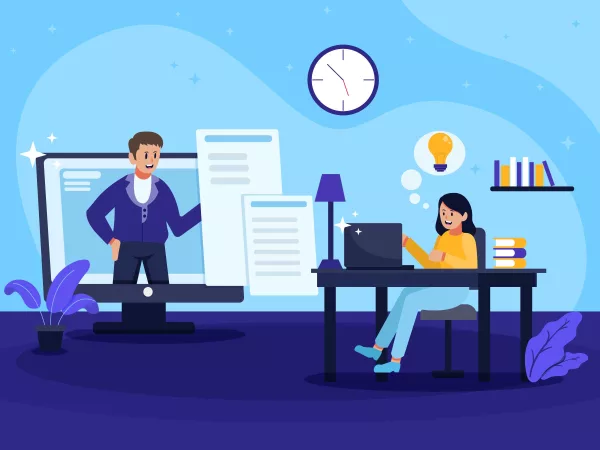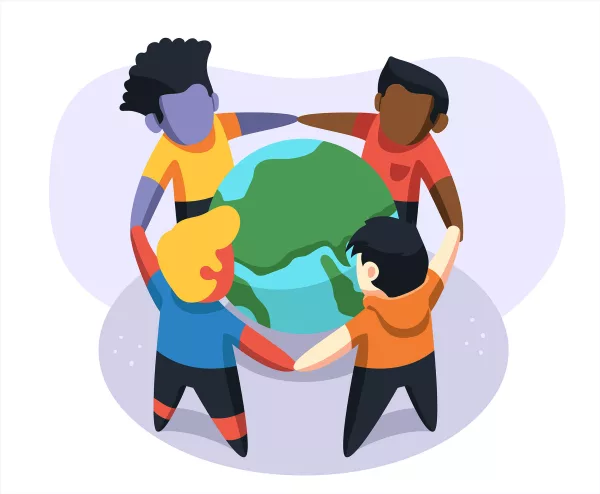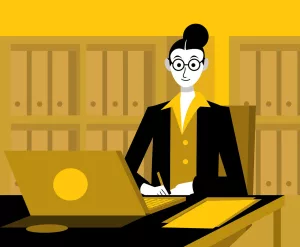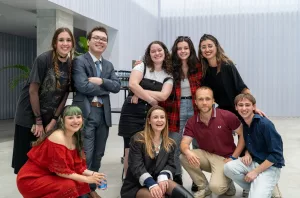“We have become too comfortable with the term emergency when it comes to climate change. If it really is one, we need to begin to act accordingly.” – Elsa Arnaiz, from Talento para la Sostenibilidad, Panel 2
Youth and Climate: Awareness, Education & Activism
Last week, IE hosted a fascinating event where climate change was on the agenda. The background for the event was to mark the partnership between IE and 1Planet4all in collaboration with Ayuda en Acción. The event was held with the IE Eco Club and three panels of climate activists and experts.
Panel 1 discussed how to generate greater awareness and outreach, and was represented by Rosa Castizo from Observatorio La Rabida, Dario Hasenstab, IE alumni and founder of RAIA, a think tank about international affairs, and Marta Guzmán, editor and coordinator for ESGLOBAL.
Panel 2 talked about the required talent, education and skills that are necessary for a green economy, and was represented by Borja Santos, IE SPEGA Associate Vice-Dean, Elsa Arnaiz, director of Talento para el Futuro, Fernando Varela from LEAD Sostenibilidad and Isabela de Alcázar, the IE Head of Sustainability.
Panel 3 ended the discussion with tools to generate effective activism to improve the climate commitments of governments, businesses and citizens. This panel consisted of Raquel Hazeu, IE SPEGA Paula Moreno from Cuatrecasas, Nacho Dean from La España Azul and Marie Khevenhüller, IE alumni from Ferrero.
All the panels talked for 30 minutes, followed by a question and answer session organized by the IE Eco Club.
Panel 1: How can we generate greater awareness and outreach?

In panel 1, Dario Hasenstab explained how he had used his degree in International Relations from IE to form RAIA. Here, he did a project where he took six impactful world leaders who have acted as climate advocates. Amongst others, he mentioned Mohammed bin Zayed al Nahyan, the president of the UAE, as the first Arab leader to sign the Paris climate agreement. Following, he posed the question: How do you convince the world’s 6th largest oil distributor to conduct policies in favor of mitigating climate change?
His questions combined international relations expertise with the challenge of global warming, which I personally, as an international relations student, found very intriguing. It was inspirational to see how Hasenstab used his degree in IR to spread awareness and hold world leaders accountable for their actions towards sustainability.
Marta Guzman, editor of ESGlobal, a Spanish digital media outlet focusing on political and economic issues, was up next. She came with a strong encouragement to the young generation to raise their voice and stay informed about climate change. In the Q and A, we had an interesting discussion about ‘green fatigue’ in the media; that people are gradually losing engagement in the climate debate, but how social media still is incredibly effective in increasing awareness.
Roza Castizo works with sustainable development and climate change in Ibero-America for Observatorio de la Rabida. With her, we discussed the recently published IPCC (Intergovernmental Panel on Climate Change)-report, and the limited attention it received, despite its importance. Furthermore, we discussed the importance of food systems. Castizo informed us that 60% of carbon emissions come from food systems. She encouraged us to reflect upon our eating habits, be coherent and change our lifestyles in favor of the planet.
Panel 2: What talent, education and skills are necessary for a green economy?

Isabela de Alcazar, IE Head of Sustainability, was first out, and shared that IE is the first European university to be recognized as carbon-neutral. Through, amongst other things, switching to low-consumption solutions, IE managed to reduce 1600 tons of carbon emissions within the last few years. IE University therefore serves as a green example for thousands of educational institutions, which is something to be proud of.
Elsa Arnaiz is another IE alumni with a Master’s in Big data and Business analytics, and Dual Bachelor’s degree in IR and Law. She is the co-founder, general director and president of Talento para el Futuro, which fights to involve youth in politics through lobbying. It is also worth mentioning that she is a new mom, and that she brought her baby to the conference. All Kudos to Arnaiz, who manages to balance it all. Her contribution was very inspirational, and she laid focus on the responsibility the youth have to involve themselves in climate change through pushing policy-makers towards change.
We have the skills and the proposals to implement green policies already. Her message encouraged IE students to become advocates for the climate. She believes that we are, or will be by the end of our university careers, privileged enough to possess the knowledge necessary to contribute to mitigating climate change.
Fernando Varela from LEAD Sostenibilidad focused more on the economic part of the green shift. He discussed how a paradigm shift, with increased focus on environment and sustainability in the supply chain, is necessary for the transition to green energy. This eventually requires collaboration between sectors.
Borja Santos built on Varela’s ideas, and introduced something that caught the attention of everyone in the room – working within sustainability IS the future, and will guarantee both a safe job and a high salary. All businesses are applying for a green economy, and the most successful companies in some decades will be working with green economy, sustainability or renewable energy. This is where the current private investment is going, and it will eventually become visible. Climate diplomacy, urbanism and architecture were examples of jobs related to the green economy that will become important, aside from the STEM-jobs, according to Borja. In addition, he announced that IE will be introducing a new bachelor’s degree next year: Bachelor of Environmental Science.
Panel 3: What tools can we use to generate effective activism to improve climate commitments of governments, businesses and citizens?

Raquel Hazeu is an IE student and climate activist, and dismantled the belief that ‘what you do individually will not make a difference’. She agrees that you won’t save the world by correctly recycling plastic once. However, she mainly argues that we dissociate ourselves from the problem of climate change if we do not coercively change our lifestyles. As soon as we commit to one lifestyle-change that favors mitigating climate change, this will be the first piece of a larger domino-effect. She also encourages IE students to watch out for greenwashing, and stay informed of which policies are really sustainable.
Paula Moreno, IE Law alumni, focused on how legislation plays a vital role in mitigating climate change. International public law is difficult to enforce nationally, so it is important to hold policy-makers accountable for how they are combating climate change.
Nacho Dean is a professional explorer and works with La Espana Azul for climate change. From 2013-2017, Dean walked around the world (yes, by foot). Later, he decided to connect the continents by swimming across the oceans. Here, he witnessed huge amounts of plastic in the oceans, and decided to work towards spreading awareness around plastic pollution. He is now a public speaker, as well as working with La Espana Azul conducting scientific research on climate change and pollution.
Marie Khevenhueller is an IE alumni, and worked on a formula for how climate activists can reach success with Ayuda en Accion. Analyzing activist methods of Greta Thunberg and other climate activists can help understand what is appealing to the public and eventually be a step forward in mitigating climate change.

It was a pleasure to attend this conference. It is eye-opening, intriguing and terrifying, all at once, to sit down and discuss climate change with experts. However, IE students shall be grateful for this opportunity and initiative towards shifting the paradigm towards a more sustainable future.






